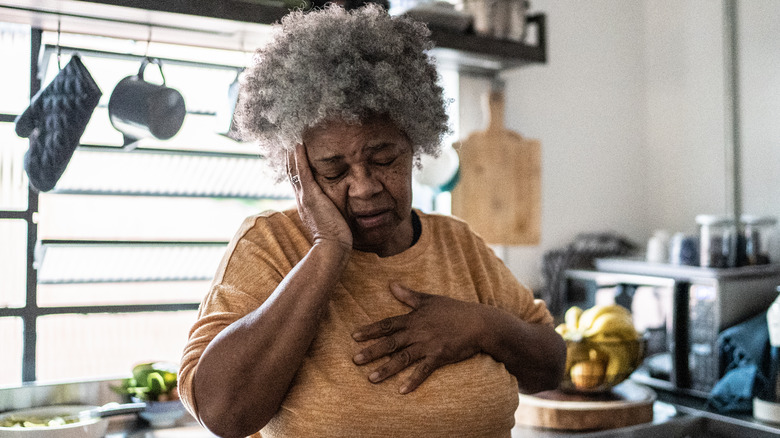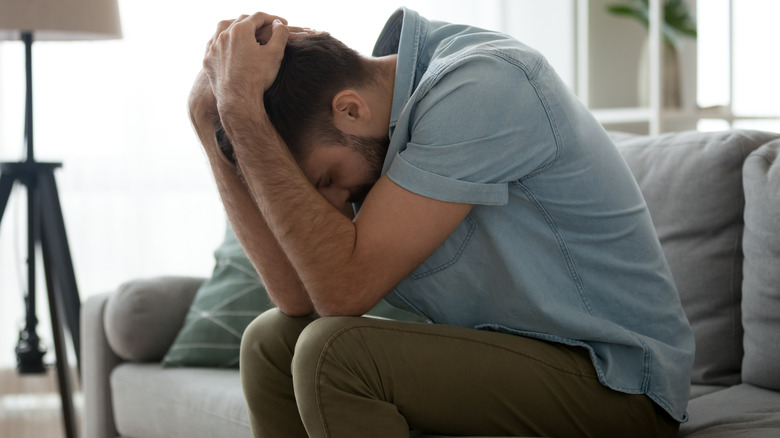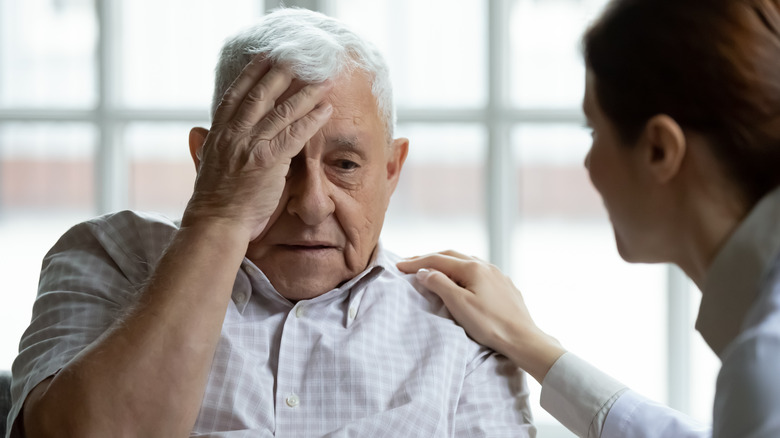This Is What Your Body Feels Like Right Before Passing Out
While fainting is not classified as a health condition on its own, in some cases, it can signal that something deeper may be going on. "Syncope — the medical term for fainting — is defined as a temporary loss of consciousness and muscle control caused by low blood flow to the brain," pediatric cardiologist Dr. Peter Aziz told the Cleveland Clinic. This reduced cerebral blood flow prompts an abrupt decrease in blood pressure and heart rate, causing a person to pass out. Seeing a person suddenly collapse from fainting can be alarming, yet it is not all that uncommon. Rather, approximately one-third of all people are affected by syncope.
Most people experience what's known as vasovagal syncope. This type of fainting may occur on occasion but is generally not cause for concern. Triggers can include stress, standing for too long, not drinking enough water, or a bout of queasiness at the sight of blood. According to the U.S. Centers for Disease Control and Prevention (CDC), getting vaccinated may also cause a person to faint. Experts have found this to occur most often in relation to the human papillomavirus (HPV) shot; Tetanus, Diphtheria, and Pertussis (Tdap) vaccine; and Meningococcal Conjugate Vaccine (MCV4). Just prior to passing out, our body usually goes through a series of physical reactions.
Reduce your chances of fainting as soon as you notice these signs
In the moments before a person faints, they may feel dizzy, nauseous, or warm, Cleveland Clinic experts explain. They may also experience headache, increased perspiration, or visual or auditory changes. The National Institute of Neurological Disorders and Stroke notes that this may include darkening or blurry vision. Skin that is clammy or cold to the touch can also be indicative that a person is about to pass out.
If you catch these signs in time, you can help reduce your chances of fainting by promptly sitting or lying down, emergency medicine physician Dr. Torree McGowan told TODAY. Repositioning your body in such a way can help facilitate blood flow to the brain and minimize your risk of falling. Contracting one's muscles can also help prevent a person from passing out by boosting blood pressure. To do so, try clenching your fists, flexing your arm muscles, or crossing or squeezing your legs together. If you feel as if you are about to faint due to the sight of blood or needles, try eating a snack or having something to drink prior to having blood drawn or getting vaccinated, suggests the CDC. Physicians can further support patients by offering calming words of encouragement.
What to do if a person passes out and when to see a doctor
In cases of vasovagal syncope, loss of consciousness is usually short-lived. Once the person has resumed consciousness and it's been determined that they are not injured, they should lie down and rest for approximately ten to 15 minutes in a soothing environment (via National Institute of Neurological Disorders and Stroke). Alternatively, a person may sit with their head tucked between their knees. Taking periodic sips of cold water is also advised. After fainting, a person is usually back to normal within the same day.
However, there are instances in which passing out may be related to a health condition, particularly if fainting spells occur more frequently. In this event, a person should consult with their physician. A 2020 study published in Frontiers of Cardiovascular Medicine found that middle-aged and older adults who had fainted two or more times within the last year reported a lower quality of life. More frequent syncope episodes may indicate a potentially serious arrhythmia or other cardiovascular condition, particularly in those with a family medical history of heart problems or fainting spells (via Cleveland Clinic). Individuals should also be particularly mindful of fainting risk during the summer, when dehydration can make one more susceptible to passing out.



